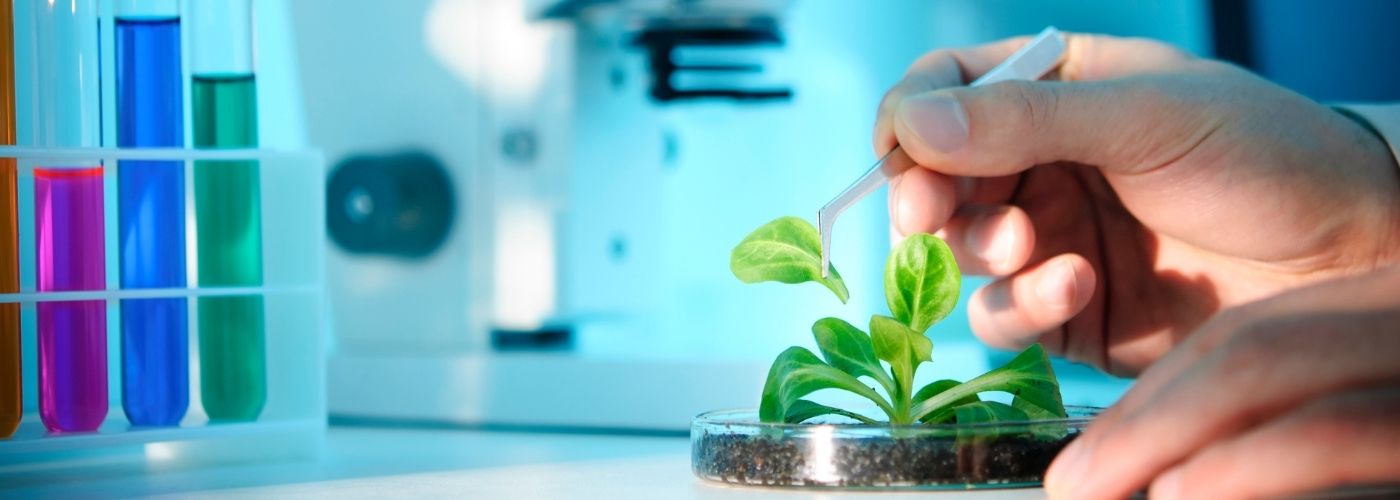
Biotechnology Future Scope
Biotechnology has progressed at a breakneck pace. It is a new field of research dedicated entirely to the advancement of science. It covers a wide range of topics, including molecular genetics, biochemistry, microbiology, immunology, genetic engineering, and many other topics in health and medicine, agriculture, and animal husbandry. Biotechnology has a wide range of uses, including the development of numerous medications, vaccines, and diagnostics and increased productivity, improved energy generation, and conservation. In the environmental forefront, it aims to increase the quality of seeds, pesticides, and fertilisers. Pollution control and waste management are aided by environmental biotechnology.

Biotechnology and its application
Biotechnology’s application was previously limited to agriculture and the production of fermented food products. Still, with the discovery of newer and more complex data containing the tiniest of structures measured in microns, biotechnology has proven to be beneficial in the production of a wide range of useful products that improve humankind’s quality of life. Biotechnology encompasses disciplines such as genetic engineering, animal cell culture, plant cell culture, microbiology, molecular biology, cytogenetics, cryopreservation, bioprocessing, biochemistry, cell biology, embryology, immunology, and bioinformatics.
When it comes to environmental science, biotechnology offers a lot of potential. It is used to recycle and remove wastes left behind by various industries at hazardous locations. Bioremediation is the word for this process. Many experiments involving DNA and RNA, and other molecular structures in the human body fall under the umbrella of biotechnology. In this decade, gene mapping has sparked a lot of curiosity, and with the completion of the Human Genome Project, new opportunities for biotechnology have opened up.

Biotechnology has also found interesting applications in the pharmaceutical industry. From antibiotic synthesis to biomolecule purification and separation, it has got you covered. Biotechnology permeates practically every aspect of life. Biotechnology is also fundamental in the field of medicine. As more genetic diseases are discovered, biotechnology is being used to try to develop ways to manipulate the genes and find a cure for the disease.
With the proper application of biotechnology in the manufacture of bio-renewable fuel from crops, the depletion of natural resources for fuel and the environmental consequences caused by the use of conventional fuels can be mitigated to some extent. Biotechnology can help these crops produce more ethanol and methane for natural gas.
Impact on various fields
Further, biotechnology has helped create more than 250 healthcare related products that are serving humanity as of now. Many of them are for previously untreatable diseases. In addition, agricultural biotechnology is used by more than 13.3 million farmers throughout the world to boost yields, avoid insect and pest damage, and reduce the environmental harm caused by farming. In addition, over 50 biorefineries are being built across North America to test and improve ways for manufacturing biofuels and chemicals from renewable biomass, which can help reduce greenhouse gas emissions.
Health

Biotechnology heals the world by utilising nature’s own toolbox and using our own genetic makeup to heal and guidelines of research by lowering infectious disease rates, saving millions of children’s lives, changing the odds of severe, life-threatening conditions affecting millions around the world, tailoring treatments to individuals to minimise health risks and side effects, developing more precise disease detection tools, and combating serious illnesses and ever-increasing diseases.
Energy

Biotechnology integrates biological processes like fermentation into microscopic manufacturing plants by harnessing biocatalysts like enzymes, yeast, and other microbes. As a result, biotechnology fuels the world by reducing the use of and reliance on petrochemicals by 80 per cent or more. Lowering the temperature for cleaning clothes and possibly saving $4.1 billion annually is another advantage. Improving manufacturing process efficiency to save 50 per cent or more on operating costs and again, reducing the use of and reliance on petrochemicals, using biofuels to cut greenhouse gas emissions by 52 per cent or more is one of it’s benefits. Reducing water usage and waste generation, and tapping into a vast reservoir of renewable energy are significant changes brought about by biotechnology.
Agriculture

Crop pest resistance, herbicide tolerance, and the use of more environmentally sustainable agricultural practices are all improved through biotechnology. In addition, biotechnology feeds the world by increasing crop yields with fewer inputs. It reduces the number of agricultural chemicals required by crops and limits their run-off into the environment. It also helps develop biotech crops that require fewer pesticide applications and allow farmers to lessen tiling farmland. Not only this, biotechnology has also helped in improving the overall productivity as well as nutrient values of various crops.
Biotechnology, in general, improves the quality of life and opens up new frontiers for modern approaches in a variety of areas.
BIOTECHNOLOGY AS A CAREER

In the past few years, knowledge of biotechnology has grown and it has emerged as a potential career path for many students. Biotechnologists are at the vanguard of constant development and innovation, whether it’s in Biochemical Engineering, making bioprinting more accessible, or generating energy from bio-sources. With COVID in the picture, the need for new treatments and vaccines, requirement and biotechnology future scope has also grown leaps and bounds.
Brief overview of pathways

A person interested in pursuing a career in Biotechnology can enrol in a variety of short- and long-term Biotechnology courses. This includes regular bachelor’s degrees such as the BSc Biotechnology and master’s degrees such as the MSc Biotechnology. A postgraduate programme is advised for those seeking a more advanced and professional career. Furthermore, in the large field of biotechnology, one can choose to acquire doctoral degrees such as a PhD in order to pursue a rewarding career in research.
Why pursue a career in biotechnology?

Here are a few reasons why you can pursue a career in biotechnology:
- Biology, chemistry, mathematics, and physics are all combined in this unique interdisciplinary programme.
- Career opportunities in the scientific and administrative fields are many.
- Projects that are both innovative and exciting.
- Inventions in agriculture, healthcare, medicine, industrial processes, and environmental management are all encouraged.
- It’s both intellectually and monetarily rewarding.
- Investigate a variety of transdisciplinary specialities.
- Act in the best interests of society.
Career scope of biotechnology

As previously said, the vast reach of biotechnology and the expansion of opportunities in this area impacts a wide range of topics. Biotechnology is an area of research that is continually expanding. New subfields continue to arise when discoveries in science and technology open up new areas of investigation and growth. R&D, regulatory affairs and quality assurance, manufacturing, and policymaking are all examples of biotechnology careers. Let’s look at some of the primary sectors where you can get work as a Biotechnology graduate:
- Healthcare
- Medicine
- Medical Sciences
- Pharmaceuticals
- Agriculture
- Animal husbandry
- Genetic Engineering
- Ecology & Environment
- Ecotechnology
- Cosmetology
- Soil Biology
- Computational Biology
- Textile Industry
Biotechnology also has the largest number of fields in which to master and gain expertise. Many facets of human life are influenced by biotechnology, and vice versa. As a result, this interdisciplinary branch naturally provides informal education in a variety of subjects, such as;
- Bioprocess engineering
- Biomedical engineering
- Forensic sciences
- Microbiology
- Biochemistry
- Beverage industry
- Stem cell industry-
- Food technology
- Microbiology
- Nutrition and Dietetics
- Bioremediation
- Photosynthetic effect
- Bioremediation
Scope of biotechnology in government sector

There are several government departments that carry out the same operations on a national scale as there are opportunities for research and development in the private sector. These studies are overseen by the Ministry of Science and Technology. The Department of Biotechnology is in charge of all biotech developments. The government announces job openings as they become available, and the application process is usually completed online. Updates are posted on the official website.
Courses for biotechnology

Biotechnology education can be obtained through a variety of courses available to students. Engineering degrees, such as B.Tech in Biotechnology, and graduate degrees, such as BSc in Biotechnology, are available. The primary distinction between the degrees is the emphasis on education in each. A bachelor’s degree in engineering focuses on industrial and engineering biosciences, whereas a bachelor’s degree in science concentrates on bioscience concepts and applications. Agriculture, Microbiology, Biochemistry, Molecular Biology, Plant Biotechnology, Industrial, Plant Biotechnology, Animal Biotechnology, and other biotechnological subjects are more woven around research and development in BSc. in biotechnology.
There are also several biotechnology diploma and certificate programmes that specialise on a specific skill or discipline of biotechnology.
Future of biotechnology

Biotechnology is a broad field that encompasses many elements of modern life and provides numerous employment and career prospects. This is due to the current need for, use of, and demand for biotechnology.
India is a developing country on its path to becoming the world’s leading hotspot for the biotechnology industry. Why? Because India has a thriving Medicine industry with ties to major countries around the world, a booming agricultural research industry to produce more efficient hybrid crops and farming methods, medical transfusion, genetic research and development, and a thriving healthcare industry, Biotechnology is essential for India to thrive.
As a result, in terms of career options and job creation, biotechnology will play a critical and significant role in the next few years. With the rising number of devastating diseases and pandemics, biotechnology will become a survival aid in the next few years. With a global population of exceeding 9 million people, we will also require new agricultural technologies. Overall, biotechnology will play an important role in the future. Biotechnology also has a significant impact on and contribution to the economy.
